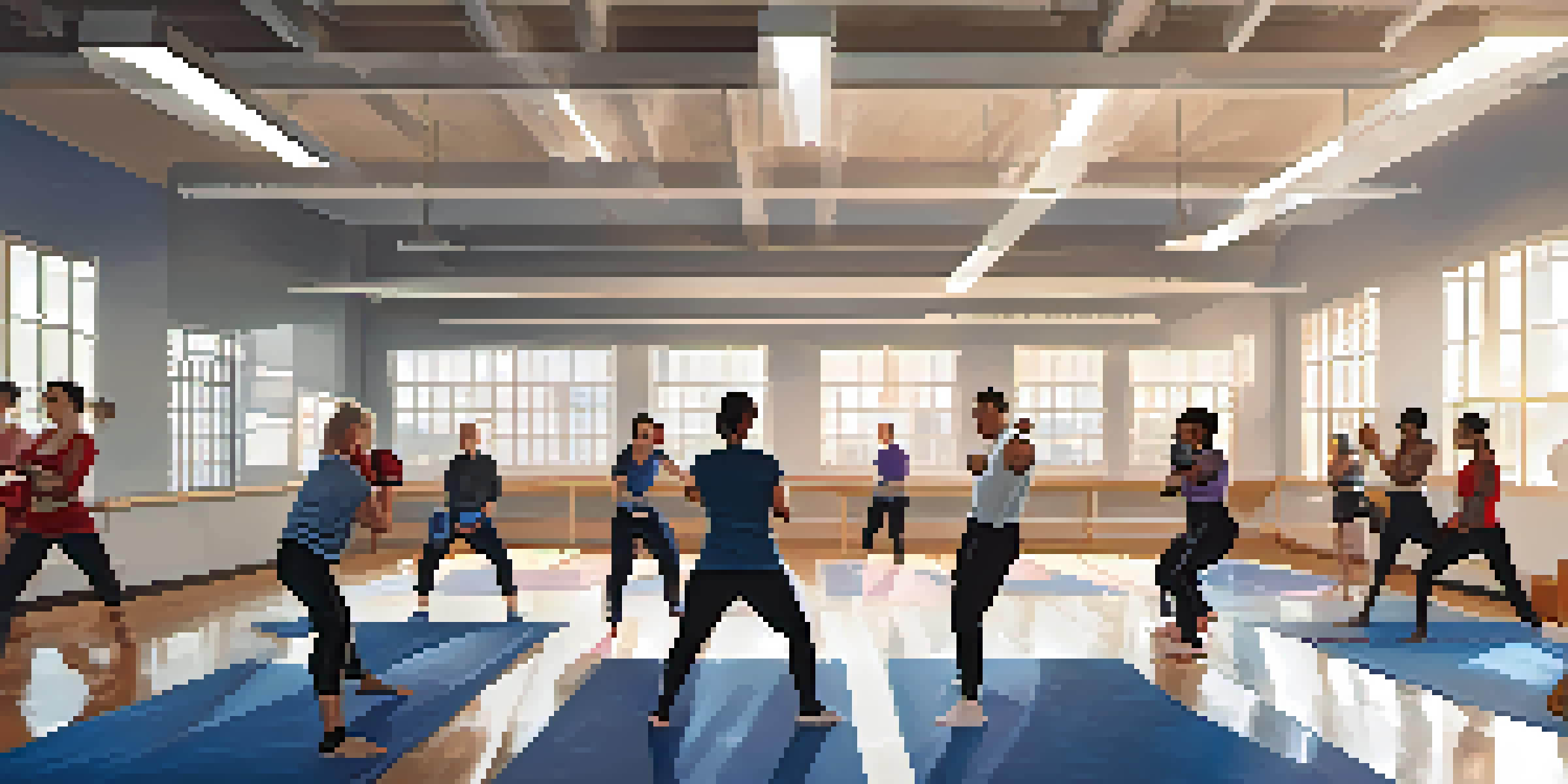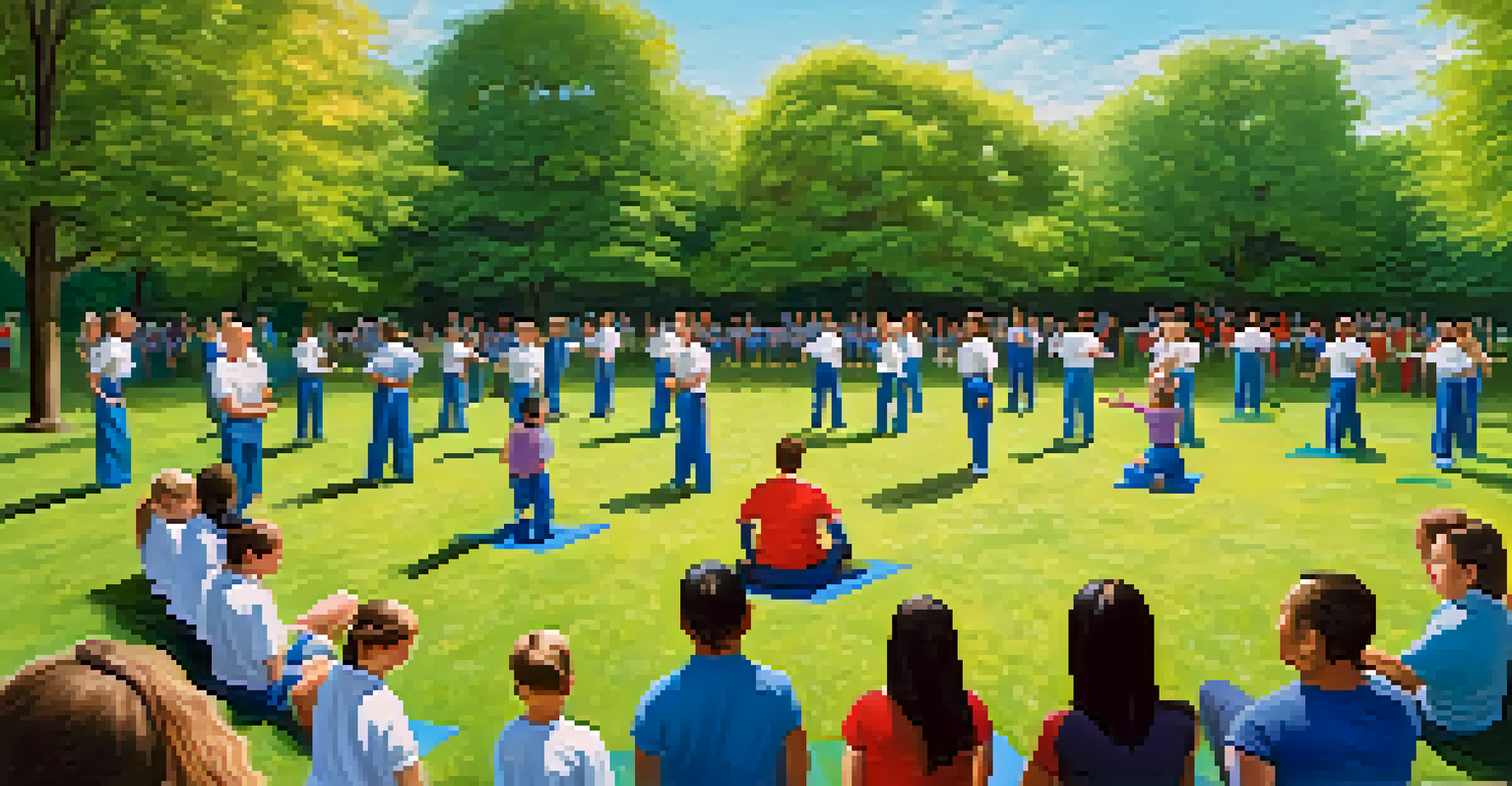Self Defense Training: Importance and Benefits Explained

Understanding Self Defense: What It Really Means
Self-defense is more than just physical combat techniques; it encompasses a mindset and a set of skills aimed at protecting oneself from harm. It's about being aware of your surroundings, recognizing potential threats, and knowing how to respond effectively. In its essence, self-defense empowers individuals to take control of their safety and well-being in uncertain situations.
The best defense is a good offense.
While many people picture martial arts when they think of self-defense, it's important to note that self-defense training can include a variety of approaches. These can range from verbal de-escalation techniques to physical maneuvers designed to escape a dangerous scenario. The goal is to equip individuals with the tools they need to handle various threats, whether they occur in a dark alley or at a crowded event.
Ultimately, understanding self-defense is about fostering confidence and resilience. It encourages individuals to trust their instincts and make informed decisions about their safety, laying the foundation for more effective responses in real-life situations.
Boosting Confidence Through Self Defense Training
One of the most significant benefits of self-defense training is the boost in confidence it provides. When individuals learn how to protect themselves, they become more assured in their ability to face challenges head-on. This newfound confidence often translates to other areas of life, making individuals more assertive in their personal and professional interactions.

Training in self-defense often involves overcoming physical and mental obstacles, which can lead to a sense of accomplishment. As students master new techniques and skills, they begin to see their progress and realize their potential. This journey of self-improvement fosters a positive mindset, encouraging participants to push their boundaries and embrace new experiences.
Self-Defense Empowers Individuals
Self-defense training equips individuals with skills and confidence to protect themselves in uncertain situations.
Moreover, the supportive environment of a self-defense class allows individuals to connect with others who share similar goals. Building relationships with fellow participants can further enhance feelings of belonging and support, reinforcing the confidence gained through training.
Physical Fitness and Self Defense: A Winning Combination
Self-defense training isn't just about learning how to protect yourself; it's also an excellent way to improve physical fitness. Many self-defense classes incorporate cardiovascular exercises, strength training, and flexibility work, providing a full-body workout that can enhance overall health. Participants often find that they feel stronger and more agile as they progress through their training.
Self-defense is not just a technique; it's a mindset.
Engaging in regular self-defense practice can also lead to better coordination and balance, which are essential not only for defending oneself but for everyday activities as well. Whether you're dodging an attack or simply navigating a crowded environment, improved physical fitness plays a crucial role. Over time, dedicated training fosters a greater awareness of one’s body and capabilities.
Additionally, the physical demands of self-defense training can help reduce stress and anxiety levels. Exercise is known to release endorphins—those feel-good hormones that boost mood and promote relaxation. Therefore, self-defense training serves a dual purpose: it prepares individuals for potential threats while enhancing their overall well-being.
Learning Conflict Resolution and De-escalation Techniques
Self-defense training goes beyond just physical techniques; it also emphasizes the importance of conflict resolution and de-escalation. Many self-defense programs teach participants how to assess situations and determine when it's best to walk away rather than engage. This focus on non-violent responses can be invaluable in preventing conflicts before they escalate.
Understanding how to communicate effectively during tense situations can help diffuse potential confrontations. Participants learn to use body language, verbal cues, and assertive communication to establish boundaries without resorting to violence. These skills are not only useful in self-defense scenarios but can also benefit everyday interactions, such as navigating disagreements at work or in personal relationships.
Boosting Confidence Through Training
Participating in self-defense classes enhances personal confidence, which can positively impact various aspects of life.
By fostering a mindset of resolution rather than aggression, self-defense training empowers individuals to handle conflicts with confidence and composure. Ultimately, this approach can lead to safer environments and healthier relationships both inside and outside of the training space.
Self Defense Training: A Tool for Personal Empowerment
At its core, self-defense training is about personal empowerment. It encourages individuals to take charge of their safety and equips them with the skills necessary to protect themselves. This empowerment can be especially significant for marginalized groups who may feel vulnerable in certain contexts, providing them with a sense of control over their circumstances.
Engaging in self-defense training allows individuals to reclaim their power in a world that can often feel unpredictable. Each technique learned and every scenario practiced reinforces the idea that they are capable of defending themselves and making informed choices about their safety. This shift in mindset can be life-changing, transforming fear into empowerment.
Moreover, self-defense training fosters a community of support and encouragement. Participants often share their experiences and challenges, creating a network of individuals who uplift each other. This collective empowerment can further enhance personal growth and resilience, making self-defense training a transformative experience.
Social Benefits of Participating in Self Defense Classes
Joining a self-defense class offers a unique opportunity to meet new people and build connections. Many participants find that they bond with others who share similar interests and goals, creating friendships that extend beyond the training environment. This social aspect can make classes more enjoyable and encourage consistent attendance.
Self-defense classes often involve teamwork, where participants pair up to practice techniques and learn from one another. This collaborative learning environment fosters a sense of community and mutual support, making the training experience more enriching. As individuals work together to improve their skills, they cultivate trust and camaraderie.
Making Self-Defense Accessible
Ensuring that self-defense training is available to all fosters a culture of safety and empowerment in communities.
Additionally, engaging in self-defense training can help break down barriers and stereotypes. It brings together individuals from diverse backgrounds, promoting inclusivity and understanding. As participants learn and grow together, they contribute to a culture of respect and empowerment, making the world a safer place for everyone.
Empowering Youth Through Self Defense Training
Introducing self-defense training to youth can have a profound impact on their development. It teaches essential skills that not only prepare them for potential threats but also instills a sense of responsibility and awareness. Young individuals learn to navigate their environments with confidence, fostering independence and self-assurance.
Self-defense classes for youth often incorporate fun and engaging activities that keep them interested while imparting valuable lessons. Through role-playing scenarios, they gain practical experience in handling various situations, which can be both educational and enjoyable. This hands-on approach helps solidify their understanding and application of self-defense concepts.

Moreover, participating in self-defense training can help young people build resilience against bullying and peer pressure. Equipped with the skills and confidence to stand up for themselves, they are less likely to become targets of intimidation. As a result, self-defense training serves as a powerful tool for youth empowerment, promoting safety and self-worth.
Making Self Defense Training Accessible to All
As the importance of self-defense training becomes more recognized, it's essential to ensure that it remains accessible to everyone. This means offering classes at various times, locations, and price points to accommodate different schedules and budgets. By breaking down these barriers, more individuals can benefit from the skills and confidence that self-defense training provides.
Community organizations and local gyms can play a significant role in promoting self-defense classes. By partnering with schools, nonprofit organizations, or community centers, they can help reach a broader audience and encourage participation. Outreach efforts can also include workshops or free introductory classes to spark interest and demonstrate the value of training.
Ultimately, making self-defense training accessible is about fostering a culture of safety and empowerment within communities. When more individuals are equipped with the knowledge and skills to protect themselves, it creates a ripple effect that contributes to a safer and more confident society.